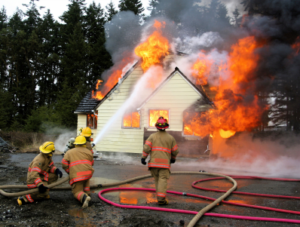 Homeowner’s accident liability is a very real thing. Every homeowner should be aware in the event of an accident that causes liability coverage to kick in.
Homeowner’s accident liability is a very real thing. Every homeowner should be aware in the event of an accident that causes liability coverage to kick in.
We recently talked about the liability coverage that comes with most homeowner’s and renter’s insurance policies. To recap, liability coverage protects you from financial responsibility for the harm or injury suffered by another because of your negligence (carelessness). The kinds of occurrences covered and the dollar amount of the protection is stated in the insurance policy.
Here, we’ll take liability insurance a step further and discuss the mechanics of it, your responsibilities, and those of the insurance company. The insurance policy explains your responsibilities and those of the insurer, so this article is an overview. Remember that your responsibilities depend in part on the kind of event that may trigger the liability protection of your policy.
Example: A guest in your home trips over an electric cord, falls and gets hurt. What do you do? How does homeowner’s insurance help?
- Do not say or do anything that could be interpreted as an admission of fault. Even saying something like “the cord shouldn’t have been there” can be construed as an admission. Instead, assist your guest in getting up if it can be done safely. If not, call, or allow your guest to call for medical attention.
- Immediately take pictures of the area where the incident occurred. That includes the room generally, the floor (showing the placement of the cord), and other pictures that disclose rugs, carpet, placement of furniture and lighting conditions. These can be valuable to your homeowner’s insurer in determining responsibility for the occurrence. Keep the pictures and the cord (or whatever other object was involved) until the insurance company asks for them.
- Promptly (RIGHT AWAY) report the event either to your homeowner’s insurance company or to the insurance agent. You will be asked by them to describe the potential claim briefly. Therefore, make notes about times, dates, names, and a description of the events leading to it so everything is fresh in your mind. A decision will be made whether the type of claim is covered by the insurance policy.
- A claim covered by the insurance policy will be assigned to an adjuster. An adjuster is a licensed insurance professional who handles claims for insurance companies. The adjuster may be an in-house adjuster (an employee of the company) or one that the insurance company hires from the outside to handle the claim. He/she will contact you for information, statements, and may want to visit your home.
Either way, it is important to confirm with your insurance company that the adjuster is either its employee or one that it hired. That’s important because sometimes the person who was hurt or his/her lawyer will hire an investigator to contact you to gather information that could later be used against you.
What Happens In Event of Accident Liability?
Once the claim has been reported to the homeowner’s insurance company and it is confirmed that it is a covered claim, the insurer has the right and the obligation to manage the claim. That is, it decides to accept or to dispute your liability (fault) and to evaluate and pay or deny payment of money to the person claiming injury or damage. If you get a letter from the individual claiming injury or damage or his/her lawyer, give it to your insurance company (or insurance agent) promptly (RIGHT AWAY).
If your insurance company decides to accept liability and it is possible to do so, it may settle the claim within the policy limits of your homeowner’s insurance liability limits. “Possible to do so” means that the person claiming injury or damage is willing to accept a settlement within those limits. However, the insurance company may believe that the individual claiming injury or damage bears some fault and that may prevent settlement. Alternatively, it may think that the injury or damage has a lower dollar value than demanded. If so, the claim is not likely to be settled.
What if You Get Sued?
If the claim cannot be settled, the other person may sue you. If that happens, you must promptly (RIGHT AWAY) notify your homeowner’s insurance company and deliver any material with which you were “served” to your insurance agent. The material will probably be called a “Complaint” and is likely to be delivered (“served”) by a Sheriff’s deputy or someone else authorized by the Court. Some jurisdictions allow service of court documents like these by mail (often registered or certified mail) so don’t ignore or avoid it. You usually do not have to be given the material directly for service to be valid; service often can be made on just about any household member. Even if you feel that the person “served” was too young or not the right person, deliver the material to your insurance agent anyway; everybody can fight about that later. The point is, get the documents to the insurance company or the insurance agent quickly because there is only a limited amount of time to respond.
If you are sued for a covered claim, a lawyer will be hired and paid by the homeowner’s insurance company to defend you. You must cooperate with the attorney, including meeting with him/her and his staff, providing material as requested, answering questions and in all other ways asked, participating in defense of the claim.
